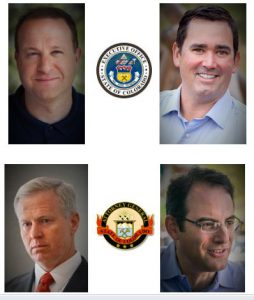In this Capitol Report:
Initiative 108 Submitted to Colorado Secretary of State
An initiative petition, #108, which has been submitted to the Colorado Secretary of State for review of its signatures, has ignited a firestorm of controversy between local governments and the petition’s advocates. The title of the initiative is “Just Compensation for Reduction in Fair Market Value by Government Law or Regulation.”
The measure would amend the Colorado Constitution’s provision concerning governmental use of the power of “eminent domain.” Eminent domain is the authority in the Colorado Constitution that allows governments to acquire private property for such public uses as schools, government structures and roads with “just compensation” to the property owners. The amount of compensation, according to the Constitution, is determined by a “board of commissioners” or “by a jury.” In brief, it would require State and local governments to pay private-property owners for actions that governments take through regulation or law that reduce the “fair-market value” of property.
Legislative Council Analysis
Here’s the analysis of the proposal as contained in the Initial Fiscal Impact Statement, which was written by non-partisan staff of the Legislative Council:
Summary of Measure
Eminent domain is the power of government to take private property for public use. A common application of this power is taking private property for roads, public schools, or other government buildings. The Colorado constitution and state statutes prohibit the taking or damaging of private property for public use without just compensation to the property owner. This initiative amends the constitutional language controlling eminent domain.
Initiative 108 amends the constitution to prohibit the reduction in fair market value of private property by government law or regulation, or for public or private use, without just compensation.
State Revenue
Procedurally, when a governmental body seeks to acquire private property through eminent domain, a court or a court-appointed commission is required to establish the amount of just compensation. Filing fees to initiate proceedings with the court system creates new state revenue. This measure will result in additional court cases, and therefore additional fee revenue; however, because the number of future court cases brought by private property owners in response to future government laws or regulations is unknown, no estimate can be made.
State Expenditures
State expenditures will increase each time a court in the Judicial Branch decides that a law or regulation has reduced the fair market value of the private property, and therefore, that the state must provide just compensation. The amount of new expenditures required to compensate property holders cannot be estimated; however, this fiscal note assumes this increase could be significant for all branches of state government.
Workload in the Judicial Branch will increase to adjudicate cases, as well as in the Department of Law each time the Attorney General is required to defend the state against a takings claim. This fiscal note assumes that the initiative is not retroactive, and applies only to alleged damage occurring after the measure’s effective date.
Local Government Impact
Similar to the state, local government workload and expenditures could increase significantly for each law, regulation or regulatory condition, that local courts rule has reduced the fair market value of private property, and therefore, that the local government must provide just compensation. Local courts also collect a fee for court filings. An increase in court cases will result in an increase in local government revenue.
Eonomic Impact
The measure will increase the cost of future laws, regulations or regulatory conditions. Public compensation for lost market value will allow certain property owners to maintain a consistent economic position despite changing regulatory conditions that might have reduced the productive value and the economic gains from their property. Governments will be required to cut spending on government programs and / or increase revenue from taxation or fees. This fiscal note does not attempt to predict a behavioral change by government in response to an increased requirement to compensate private property owners.
Proponents
If Initiative 97 (the 2,500-foot setback measure for oil-and-gas wells) should qualify for the November ballot and be approved by the voters this November, then Initiative 108–should it also be qualified for the ballot and approved by the voters–would provide the energy industry and mineral-rights owners with financial compensation for the reduced fair-market value of their property because oil-and-gas production would be greatly restricted (see below).
The advocates for Initiative 108 include the Colorado Farm Bureau, the Colorado Alliance of Mineral and Royalty Owners (CAMARO) and the energy industry. The lead energy-backed organization advocating the initiative is Protect Colorado.
Opponents
Sam Mamet, veteran Executive Director of the Colorado Municipal League, told Mark Jaffe of Colorado Politics that “My advice to counties and municipalities is if this passes, don’t do anything . . . no zoning, no ordinances.” An article has been published sharing his concerns. An issue committee, “Save Our Neighborhoods,” has been formed to oppose Initiative 108. No contributions have been made to the Committee.
Colorado Chamber Position
The policy of the Board of Directors of the Colorado Chamber is to wait until an initiative has been qualified by the Colorado Secretary of State for the November ballot before taking a support, oppose or neutral on the measure.
More Information and News Media Coverage
For news media coverage and additional information, read:
“Elections Matter: Legislative and Governor’s Races Plus Potential Critical Ballot Measures Face Business Community,” Colorado Capitol Report, August 10th.
“Effort to make Colorado governments pay for hurting property values turns in petitions in bid for ballot,” by Ed Sealover, The Denver Business Journal, August 6th.
“Initiative 108: Opposition ramping up against pro-oil & gas ballot measure,” by Marianne Goodland, Colorado Politics, August 2nd.
“Colo. ballot initiative could blunt local land-use rules, officials warn,” by Mark Jaffe, Colorado Politics, July 31st.
Leadership Changes on Colorado Chamber’s Water Quality Committee
For more than three decades, Jerry Raisch has provided incredible leadership as Chair of the Water Quality Committee of the Environmental and Energy Council.
Jerry, a Partner at Vranesh and Raisch, LLP, Boulder, has dedicated a tremendous amount of time and resources over many years in serving in this role. He has provided guidance and leadership on major pieces of legislation and regulations that addressed water-quality issues in Colorado. His efforts ensured that the interests of Colorado Chamber members were protected and that their voices were always heard by state legislators and agency staff, the latter of whom often proposed changes to existing water-quality standards. We thank Jerry for his deep commitment to our organization and wish him the best!
It is also our pleasure to announce that Gabe Racz has been appointed the new Chair of the Water Quality Committee by Council Chair John Jacus, Partner, Davis Graham and Stubbs.
We believe that Gabe will be an excellent Committee Chair. He has been a Partner at Vranesh and Raisch, LLP, since 2013 and specializes in water quality, water rights and environmental matters including:
- Hearings before the Colorado Water Quality Control Commission regarding water-quality standards, rulemakings, and policies.
- Discharge permitting matters;
- Water-rights adjudication, including surface and groundwater rights, non-tributary groundwater, changes of water rights and plans for augmentation;
- Evaluation, including title examination, of water rights purchase-and-sale transactions;
- Water storage and pipeline-project environmental permitting, including Section 404 dredge and fill permitting, Endangered Species Act, and National Environmental Policy Act matters.
Gabe is a member of the Colorado Bar Association, Environmental Law and Water Law Sections, and has been active in the Colorado Water Quality Forum. Gabe has appeared frequently before the Colorado Water Quality Control Commission as well as in the water courts and district courts.
The Water Quality Committee meets throughout the year based on key legislation or regulations that require the review and feedback by Committee members. Please notify Laura Moss 303.866.9652 if you would like to participate in this Committee.
Colorado’s 2018 Political Playoffs
Sponsorships now available for Colorado Chamber of Commerce Annual Meeting Luncheon. Click here for sponsorship opportunities. Do not miss the opportunity to connect with business leader’s from across the state on Thursday, October 25th.
Governor
Polis (D) and Stapleton (R)
Attorney General
Brauchler (R) and Weiser (D)



